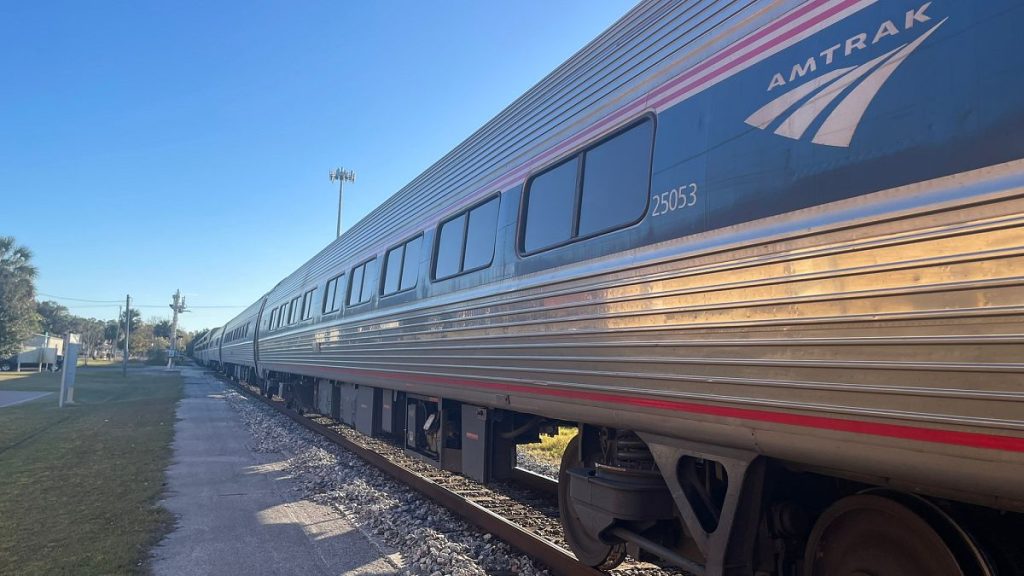Aboard the Silver Meteor, a train snaking its way from Miami to New York City, a microcosm of America unfolded in the aftermath of Donald Trump’s re-election. The 27-hour journey, traversing key swing states, became a stage for anxieties and aspirations, revealing the deep divisions that characterized the nation. The train, a metallic serpent crawling along the East Coast at a languid pace, hosted passengers from diverse backgrounds, their personal stories intertwined with the political landscape. The stark contrast between the opulent private cabins and the more modest coach seats mirrored the economic disparities that fueled much of the political discourse. A bar, presided over by a wry bartender, served as a neutral ground where these disparate voices converged, their hopes and fears swirling amidst the clinking of glasses and the rhythmic clatter of the train.
Linda and Paul, a couple celebrating their anniversary, embodied the internal conflicts playing out within families and communities. Linda, a staunch Kamala Harris supporter, grappled with her husband’s reluctant vote for Trump. Their differing priorities – women’s rights versus economic concerns – highlighted the complex calculus that drove voters’ choices. Linda’s bewilderment at the number of women who switched their allegiance to Trump underscored the disconnect between political rhetoric and personal experiences. Paul’s assertion that the election wasn’t about women’s rights but about money, coupled with his later admission that Linda was right, encapsulated the internal contradictions that many voters faced. Their conversation, punctuated by the bartender’s sardonic commentary, painted a vivid picture of a nation grappling with its identity.
Mark, a Vietnam War veteran, offered a blunt assessment of the situation, his expletive-laden denunciation of Trump resonating with some and alienating others. His belief that Trump only cared for the rich reflected a sentiment shared by many working-class Americans who felt abandoned by the political system. His grim prediction of impending war, fueled by anxieties about international instability, further darkened the mood. Lois, a former teacher and banker, provided a counterpoint, dismissing the political theatre as childish squabbling. Her cynical observation, “money talks, bullshit walks,” captured the pervasive sense of disillusionment with the political process.
Ocean and Kobe, a young couple returning from visiting family in the South, brought a different perspective. Their self-described liberal leanings and their discomfort in the South highlighted the cultural divide between urban and rural America. They expressed disappointment with both candidates, particularly Harris’ stance on Israel and Palestine, revealing the disillusionment felt by some on the left. Their concern for the suffering that would result from Trump’s victory, coupled with their critique of Harris’ policies, underscored the complexity of their political position.
Julie and Kevin, accompanied by their daughter and friend Mike, represented a contrasting viewpoint. Their enthusiasm for Trump’s victory stemmed from concerns about the economy and immigration. Their belief that immigrants were unfairly benefiting from the system, fueled by a constant barrage of media coverage, revealed the effectiveness of Trump’s populist rhetoric. Mike’s criticism of those he perceived as abusing the welfare system added another layer to the debate, highlighting the anxieties surrounding economic security. Despite their support for Trump, they acknowledged the flaws in the political system and expressed a desire for change.
The final encounter, between two brothers playing chess in the bar carriage, provided a poignant reflection on the erosion of faith in democracy. Carl, a former engineer, expressed his deep sorrow at Trump’s re-election, lamenting his disrespect for the American flag and veterans. His disillusionment with the Republican party, which he once supported, signaled a profound shift in the political landscape. Paris, his younger brother and a former marine, articulated a sense of powerlessness, expressing his belief that voting was meaningless. His cynicism, fueled by a sense of betrayal by the political system, offered a stark contrast to the hopes and aspirations expressed by other passengers. Their conversation, interrupted by the bar manager’s suspicion about their concealed alcohol, ended on a note of despair, their question, “What does that say for America?” hanging heavy in the air.
The train journey, a microcosm of America’s political and social landscape, revealed a nation fractured along multiple fault lines. The passengers’ diverse backgrounds, political views, and personal experiences intersected and diverged, creating a tapestry of hope and despair, optimism and cynicism. The Silver Meteor, chugging slowly towards its destination, became a symbol of a nation in transition, its future uncertain, its citizens grappling with the challenges that lay ahead. The train’s slow progress mirrored the arduous journey towards healing and reconciliation, a journey that would require empathy, understanding, and a willingness to bridge the divides that separated them.














